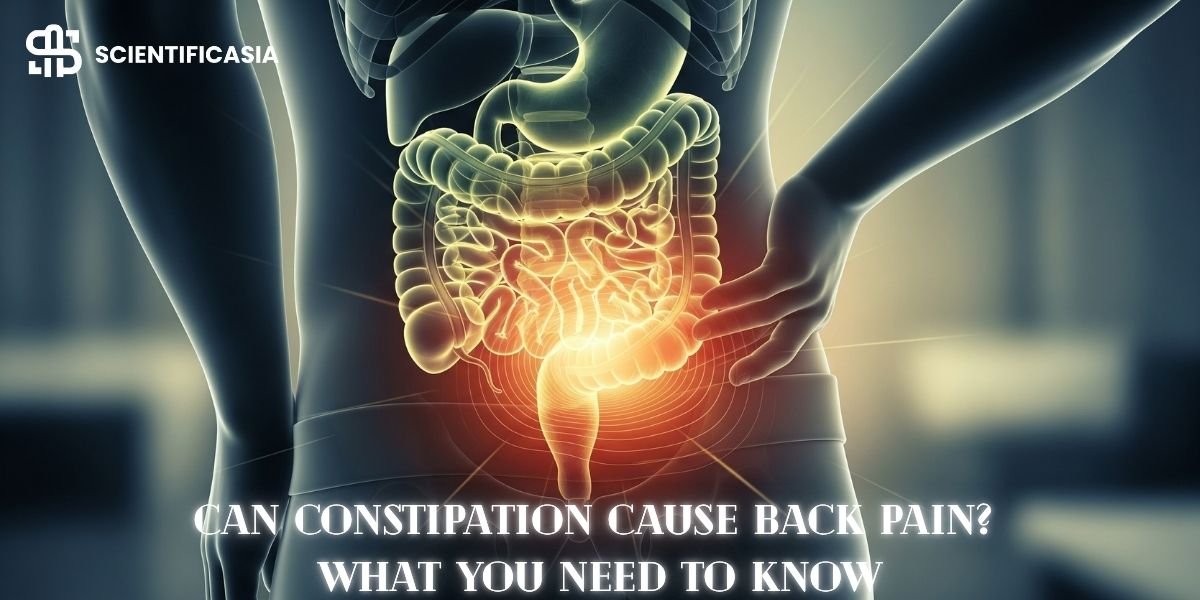Feeling stubborn lower back pain despite good posture and movement? It’s tempting to chalk it up to muscle strain or sciatica, but can constipation cause back pain, too? When hard, retained stool presses against spinal nerves, you might notice a dull ache or pressure in your lumbar region. Yet more often, constipation and back pain share common roots like poor diet, dehydration, or sedentary habits.
Before you tweak how to sit with sciatica or reach for a back brace, it helps to understand the link between your gut and spine. In this guide, you’ll discover when constipation is truly behind lower back pain, red flags that warrant medical attention, and gentle remedies—from dietary tweaks to simple stretches—to relieve both bowel and back distress.
How Constipation and Back Pain Are Linked
When hard, dry stool builds up in your colon, it can press against nerves branching from your lower spine. This direct pressure on nerves often presents as a dull, achy discomfort in the lumbar region, making you wonder, can constipation cause lower back pain when no injury seems apparent?
In more severe cases, fecal impaction—in which a mass of stool becomes lodged in the rectum—can trigger intense cramping, urinary changes, and acute back pain. This condition requires prompt medical attention, as impaction not only exacerbates lower back pain with constipation but also risks serious complications if left untreated.
When Both Symptoms Share an Underlying Cause
Occasionally, constipation and back pain coexist, not because one directly causes the other, but because they both stem from a shared medical issue. Recognizing these connections can help you target the root problem rather than merely treating each symptom in isolation.
Irritable Bowel Syndrome & Central Sensitization
In IBS, the nerves lining your digestive tract become hyper-reactive, sending amplified signals even to mild stimuli. This central sensitization doesn’t stay in the gut—instead, the same amplified nerve traffic can “spill over,” manifesting as discomfort in adjacent regions like the lower back. Patients often describe a dull, dragging ache that intensifies during bowel spasms and eases after relief.
- Common IBS co-symptoms: bloating, alternating constipation and diarrhea, visceral hypersensitivity
- Associated pain syndromes: fibromyalgia, interstitial cystitis, tension headaches
Neurologic Disorders
Neurodegenerative diseases such as Parkinson’s and multiple sclerosis disrupt the spinal pathways that coordinate muscle tone and gut motility. In Parkinson’s, for example, reduced dopamine levels slow the rhythmic contractions of your colon, while simultaneously causing rigidity in paraspinal muscles. The result is a double hit: stool stagnates and hardens, and the lower back remains tense and painful.
Tumors and Mass Effects
A benign or malignant mass in the abdomen or pelvis can crowd the colon, slowing stool passage and causing constipation upstream. At the same time, that mass may press on spinal nerve roots or the lower vertebrae, generating radiating back pain.
- High-risk warning signs: unexplained weight loss, loss of appetite, night sweats
- Red-flag back symptoms: persistent pain unrelieved by position changes, leg weakness, sensory loss
Medication Side Effects
Many medications prescribed for chronic pain or spasticity have constipation as a predictable side effect, particularly in the context of back pain from constipation.
- Opioids (e.g., morphine, oxycodone): bind to gut receptors, slowing peristalsis
- Muscle relaxants (e.g., cyclobenzaprine): reduce smooth muscle tone throughout the body
- Anticholinergics & certain antidepressants: interfere with digestive secretions and motility
By understanding these shared pathways—nerve hypersensitivity, neurological impairment, physical compression, and drug effects—you can work with your healthcare provider to address both constipation and back pain in a unified treatment plan.
How to Tell If Constipation Is Causing Your Back Pain
Figuring out whether your ache is due to constipation and back pain overlap—or a separate spinal issue—starts with a few simple checks. Walk through these questions yourself or discuss them with your healthcare provider to narrow down the cause.
- Does the pain improve after you go? Relief following a bowel movement suggests nerve pressure from impacted stool rather than true musculoskeletal strain.
- Are you taking constipating medications? Opioids, anticholinergics, and certain antidepressants often slow gut motility and can trigger both hard stools and referred back pain.
- Is bloating or abdominal discomfort present? Gas, swelling, or firm pockets in your lower abdomen often coincide with lower back pain, constipation patterns.
- Do changes in posture or movement exacerbate the pain? If twisting, bending, or standing makes it significantly worse, a structural back issue—like a herniated disc—may be at play rather than stool buildup.
By relating your bowel habits and medication history to the character of your back pain, you can better decide whether home remedies for constipation will bring relief or if further evaluation for true spinal pathology is needed.
How to Relieve Lower Back Pain from Constipation
When you’ve confirmed that constipation can cause back pain, targeted relief starts with easing bowel movements and soothing spinal nerves. Combine dietary, lifestyle, and at-home strategies to address both issues simultaneously.
Diet & Lifestyle Tweaks
- Boost Fiber Intake: Aim for 25–30 g daily through berries, leafy greens, beans, and whole grains to soften stool and reduce nerve pressure.
- Stay Hydrated: Water is crucial, but a warm cup of coffee in the morning can stimulate your bowels, helping you both move stool and relieve pressure on your lower back.
- Move Regularly: Gentle walks, yoga stretches, or seated pelvic tilts—especially when combined with proper posture guidance on how to sit with sciatica—improve gut motility and ease spinal stiffness.
- Abdominal Self-Massage: Using gentle, circular strokes following the colon’s path (up the right side, across the belly, then down the left), you can stimulate peristalsis and relieve both bloating and nerve compression—an often overlooked yet effective home remedy.
OTC Aids & Home Remedies
- Fiber Supplements & Stool Softeners: Psyllium husk or docusate sodium can kickstart regularity—consult your provider before starting.
- Mild Laxatives or Colonic Cleanses: Use sparingly for acute relief; overuse can worsen constipation long-term.
- Heat & Topicals: A warm compress on your lower back relaxes tight muscles without aggravating digestive discomfort.
By addressing both the root of your constipation and the resulting nerve irritation, these steps can significantly relieve lower back pain from constipation, helping you reclaim comfort and mobility.
When to Seek Medical Help
While most cases of back pain from constipation resolve with home care, consult a healthcare provider if you notice any of the following warning signs:
- Severe or Prolonged Back Pain: Lasting more than two weeks despite dietary and lifestyle changes.
- Rectal Bleeding or Incontinence: Blood in stool or loss of bladder/bowel control may signal fecal impaction or neurological involvement.
- Sudden Leg Numbness or Weakness: Could indicate spinal nerve compression beyond simple constipation.
- Unexplained Weight Loss or High Fever: Red flags for underlying conditions such as malignancy or infection that require prompt evaluation.
Early diagnosis ensures you’re not overlooking a more serious cause of constipation and back pain, and lets you get the right treatment faster.
Conclusion: Finding the True Source of Your Pain
Yes, constipation can cause lower back pain, but it’s rarely the whole story. Distinguishing between direct nerve pressure from a packed colon and shared root issues—like IBS, neurologic disorders, or medication effects—guides you to the most effective relief. Start with dietary fiber, hydration, movement, and at-home techniques. When in doubt, seek medical attention to rule out serious complications. With a clear understanding of your symptoms, you can restore both digestive comfort and spinal health, and get back to your life without pain slowing you down.















